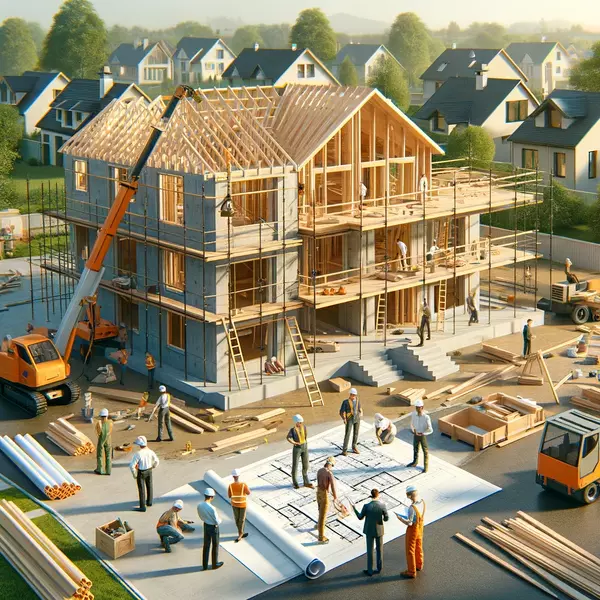Exclusive Right vs Exclusive Agency: Understanding the Difference

Are you in the market for a new house, apartment, or any other type of real estate property? As a homebuyer or seller, it's important to understand the different agreements that exist in the real estate industry. Two of the most common agreements are exclusive right and exclusive agency. They may seem similar at first, but they have different terms, legal implications, and obligations. In this blog post, we will explain the difference between exclusive right and exclusive agency real estate agreements. Exclusive Right Agreement: What is it? An exclusive right agreement is a legal contract between the real estate agent and the home seller. This agreement gives the agent the exclusive right to sell the property during a specific period. What this means that the agent has the sole authority to market the property, find buyers, and complete the transaction. The seller cannot engage with any other agent or broker. Additionally, will not have to pay any additional fees, even if they find the buyer themselves. Exclusive Agency Agreement: What is it? An exclusive agency agreement is another type of contract between the real estate agent and the seller. In this agreement, the seller chooses one agent to exclusively market and sell the property. However, unlike the exclusive right agreement, the seller retains the right to sell the property through their own efforts and without the involvement of the agent. If the seller sells the property themselves, they will not have to pay any commission to the agent. 1. Legal Implications The exclusive right agreement is the most secure for real estate agents. Real estate agents will get paid regardless of how the property was sold. In contrast, in an exclusive agency agreement, the agent will only get paid if they're the one who introduced the buyer to the property. Otherwise, there is no commission for them. 2. Obligation With exclusive right, the real estate agent has to put more effort and money into marketing the property since they are guaranteed to earn a commission. The agent will use different tactics to attract potential buyers. Such as advertising, open houses, and online marketing. In the exclusive agency agreement, the agent's efforts are limited because the seller has the option to sell the property themselves. 3. Exclusivity In an exclusive right agreement, the seller is not allowed to work with any other agent or broker to sell the property. They still can still sell it on their own. An exclusive agency agreement, the seller is allowed to sell the property themselves and only the agent that the seller had selected can market and sell the property. In conclusion, opting for an exclusive right or exclusive agency agreement has its advantages and disadvantages. An exclusive right agreement is more secure for the real estate agent, and the effort put into marketing the property will be higher. On the other hand, an exclusive agency agreement provides the seller with flexibility and lower commission fees if they sell the property themselves. When deciding which agreement to choose, sellers should consider their personal and financial goals and consult with a real estate expert. By understanding the difference between these two real estate agreements, you will be well-equipped to make the best choice for your situation and get the most out of your sale. Contact Shawn Wilmoth REALTOR® today for help finding exactly what you're looking for. www.shawnwilmoth.com
Read MoreModular Homes vs Mobile Homes: What's the Difference?

Choosing between modular homes and mobile homes can be overwhelming for many home buyers. They both have their advantages and disadvantages, making it difficult to determine which one is better for your needs. Modular homes are designed like traditional homes and are built in sections that are assembled on-site. Mobile homes, on the other hand, are built on a steel chassis and are designed to be moved from one location to another. In this blog post, we will compare modular homes vs mobile homes, their differences, benefits, drawbacks, and costs to help you make an informed decision. The Construction Process Modular homes are built in sections in a factory, where they are subjected to stringent quality control checks. Afterward, the sections are transported to the building site and assembled on a foundation. As a result, modular homes are quicker to build than traditional homes. The construction process usually takes weeks, and they are designed to meet all building codes. Mobile homes are built on a chassis in a factory and are transported to their location. However, installing mobile homes is not as time-efficient as it is for modular homes. There are also fewer standards in the mobile home industry, so it's essential to hire a reputable manufacturer that uses high-quality materials. Customizability Modular homes offer greater flexibility in design than mobile homes. Since they are built-in sections, you can customize them to meet your unique needs and preferences. This means that you can select the features, materials, and finishes that you want, similar to traditional homes. Mobile homes, on the other hand, offer limited customizability because of their design and layout. As they are built on a chassis, it becomes challenging to modify them once they have been constructed. However, some manufacturers provide some level of customization in the layout, size, and finishes. Costs Modular homes are generally more expensive than mobile homes. They have a higher initial investment cost because they are built to the same standards as traditional homes. This means that you'll have to pay for other expenses such as the foundation, permits, transportation, and assembly. However, you will benefit from the long-term value of your home on resale. Mobile homes are cheaper than modular homes but may depreciate more quickly due to their construction materials. They are also subject to a shorter lifespan, and this may require more maintenance and repairs over time. Durability Modular homes are built to withstand harsh weather conditions and time. They can be as durable as traditional homes and have a longer lifespan than mobile homes. They have a solid foundation, high-quality materials, and undergo rigorous inspections during and after construction to ensure they meet all building codes. Mobile homes, on the other hand, are more susceptible to damage from severe weather conditions such as tornadoes or hurricanes. This is because they are built-in sections transported on a chassis, which leaves them more prone to damage. The decision to buy a modular home or a mobile home depends on your unique needs and circumstances. Modular homes are more durable, customizable, and have a longer lifespan. However, they are more expensive than mobile homes. In contrast, mobile homes are cheaper, easily transportable, and have a shorter lifespan. Still, they are less customizable than modular homes. In conclusion, before making any decisions, we advise that you consult with a reputable real estate agent or contractor. They will guide you on what options align with your preferences, budget, and lifestyle. Identifying the best type that meets your needs will ensure that you get the best return on investment in the long run. Contact Shawn Wilmoth REALTOR® today for help finding exactly what you're looking for. www.shawnwilmoth.com
Read MoreThe 5 Elements of Negotiation in Real Estate

When it comes to real estate, negotiation is an essential part of the buying and selling process. Negotiation skills can mean the difference between getting the best deal possible or settling for less. In this blog post, we'll delve into the five elements of negotiation and how they apply to real estate. 1. Preparation: Gather All Necessary Information Before beginning negotiations, it's crucial to gather all the necessary information. As a buyer or seller, you need to research the property, market conditions, and the other party involved. Knowing the property's history and the seller's motivations can give you an advantage regarding price. In addition, having market data can help you determine whether the asking price is reasonable. 2. Relationship Building: Establish a Positive Rapport Establishing a positive rapport with the other party builds a foundation of trust and open communication. You can do this by being friendly, honest, and transparent. Show that you're interested in working with the other party to find a mutually beneficial solution. By establishing a good relationship, you'll gain their confidence, making it easier to negotiate and reach an agreement. 3. Communication and Active Listening: Clearly Express Your Needs and Interests While Actively Listening Communication and active listening are also critical components of negotiation. Clearly expressing your needs and interests while actively listening to the other party's perspective is key to understanding what they want. When both parties can articulate their goals and concerns, it's easier to find a middle ground, a win-win situation for both parties. Active listening is also important when you need to clarify any misunderstandings or address any counterarguments. 4. Problem-Solving: Collaborate to Find Mutually Beneficial Solutions Negotiation is not about winning or losing; it's about finding mutually beneficial solutions. Parties must collaborate to establish a win-win situation. Problems can arise during the negotiation process, and it's essential to have creative problem-solving skills to address any conflicts or obstacles. Look for alternatives to a proposed solution or offer ways that may benefit both parties. 5. Closing and Follow-Up: Finalize the Agreement, Ensure All Terms are Met, and Maintain a Professional Relationship After a successful negotiation, it's time to finalize the agreement. Ensure that all terms are met before closing on a deal. After the deal is closed, maintain a professional relationship with the other party. If a relationship was established based on honesty and trust, maintaining that relationship may bring future business deals. In conclusion, the five elements of negotiation are essential skills to succeed in buying or selling real estate. Preparation, Relationship Building, Communication, Problem Solving, Closing and Follow-Up. In real estate, negotiation is crucial to find a win-win situation for both parties. It is vital to have a clear understanding of what you want and what the other party wants. Build rapport based on trust and transparency, listen actively, and collaborate to reach a mutual beneficial solution. Finally, ensure all terms are met before closing the deal and maintain a professional relationship. These negotiating skills can make a real difference in obtaining the best possible outcome in your real estate transactions. Contact Shawn Wilmoth REALTOR® today for help finding exactly what you're looking for. www.shawnwilmoth.com
Read MorePros and Cons of Refinancing Your Home

Refinancing your home can be a great way to save money and reduce your monthly mortgage payments. However, it's not always the right choice for everyone. Before you decide to refinance your home, it's important to understand the pros and cons. In this blog post, we'll walk you through everything you need to know about refinancing your home and help you make an informed decision. 1. What is Refinancing? Refinancing involves taking out a new mortgage to replace your existing one. This can help you lower your interest rate, reduce your monthly payments, and save money over the life of your loan. Refinancing can also help you access your home's equity, which you can use to pay off debt, make home improvements, or invest in other areas. 2. The Pros of Refinancing Your Home There are several benefits to refinancing your home, including: - Lower Interest Rates: If the current interest rates are lower than when you first took out your mortgage, refinancing can help you save money on your monthly payments and reduce the total amount of interest you pay over the life of your loan. - Home Equity: Refinancing can help you access your home's equity, which you can use to pay off debt, make home improvements, or invest in other areas. - Reduced Monthly Payments: If you're struggling to make your monthly mortgage payments, refinancing can help you reduce your monthly payments and make them more manageable. - Change Loan Terms: Refinancing can help you switch from an adjustable-rate mortgage to a fixed-rate mortgage, which can provide greater stability and predictability for your monthly payments. 3. The Cons of Refinancing Your Home While refinancing can offer a number of benefits, there are also some potential downsides to consider: - Closing Costs: Refinancing typically involves paying closing costs, which can add up to thousands of dollars. Before you make the decision to refinance, be sure to carefully consider whether the potential savings will outweigh the costs. - Extended Loan Terms: Refinancing can lead to a longer loan term, which could mean paying more in interest over the life of the loan. It's important to run the numbers and consider the overall impact of extending your loan term. - Qualification Requirements: Refinancing your home requires meeting certain eligibility requirements, such as having a good credit score and adequate income. If you don't meet these requirements, refinancing may not be an option for you. 4. When Refinancing Makes Sense So, when does it make sense to refinance your home? Here are some scenarios: - Lower Interest Rates: If the current interest rates are significantly lower than when you first took out your mortgage, refinancing can help you save money on your monthly payments and reduce the total amount of interest you pay over the life of your loan. - Home Equity: If you have significant equity in your home and want to access it to pay off debt or make home improvements, refinancing can help you do so. - Change in Finances: If your financial situation has changed since you first took out your mortgage (e.g., you have a higher income), refinancing can help you take advantage of better terms and lower interest rates. 5. When Refinancing Isn't the Right Choice There are also times when refinancing isn't the best option, such as: - High Closing Costs: If the closing costs associated with refinancing are high, it may not be worth it to refinance your home. - Short Timeframe: If you plan to sell your home in the near future, refinancing may not be the best choice, as you might not recoup the costs associated with refinancing. - Poor Credit: If your credit score has dropped since you first took out your mortgage, refinancing may not be an option as you may not qualify for a lower interest rate. Refinancing your home can be a great way to save money, reduce your monthly payments, and access your home's equity. However, it's important to carefully consider the pros and cons before making the decision to refinance. By weighing the potential benefits and drawbacks, you can make an informed decision that's right for your unique financial situation. Contact Shawn Wilmoth REALTOR® today for help finding exactly what you're looking for. www.shawnwilmoth.com
Read MoreEverything You Need to Know About PMI Mortgage Insurance

If you're a first-time homebuyer or a renter planning to buy a home, you likely know that homeownership comes with additional costs beyond the purchase price. One of those costs is Private Mortgage Insurance (PMI). But what is PMI, why is it required, and how does it impact your mortgage payments? In this blog post, we'll provide in-depth information on PMI mortgage insurance, ensuring you have the knowledge you need during your home-buying journey. What Is PMI Mortgage Insurance? Private Mortgage Insurance (PMI) is insurance for lenders. It comes when you are unable to make a down payment of at least 20% of your home's purchase price. PMI is required by the lender to protect against potential financial losses if you default on your mortgage. PMI is added to your monthly mortgage payment and is typically between 0.3% to 1.5% of your original loan amount. When Is It Required? If you made a down payment of less than 20% on your home, your lender will likely require you to buy PMI. However, there are alternatives to PMI, like building up enough equity in your home. You can also take out a piggyback mortgage. If you're unsure whether you need PMI or not, speak with your lender or a mortgage professional. How Does It Impact Your Mortgage Payments? Adding PMI to your monthly mortgage payment will increase your housing expenses. If you're paying $1,500 per month on a mortgage without PMI, adding a PMI premium of $75 a month will increase your total monthly payments to $1,575. However, as you pay down your mortgage and build equity (typically around 20% of your home's value), you can request that PMI be canceled. PMI is Not the Same as Homeowner's Insurance It's essential to know that PMI is different from homeowner's insurance. While PMI protects the lender if you default on your mortgage, homeowner's insurance protects you. It protects, against damage to your home and property. In certain cases, you may be required to have both types of insurance, but they provide different types of coverage. In conclusion, PMI mortgage insurance can be a beneficial tool that allows you to become a homeowner with a smaller down payment. However, it's essential to understand how PMI works, when it's required, and how it impacts your monthly mortgage payments. By being well-informed, you can make educated decisions while navigating the home-buying process. Remember to speak with your lender, a mortgage professional, or a homeowner's insurance agent if you have questions about PMI or any aspect of homeownership. Contact Shawn Wilmoth REALTOR® today for help finding exactly what you're looking for. www.shawnwilmoth.com
Read MoreFinding Knoxville's Best Commercial Realtor

For businesses looking to lease or buy commercial real estate in Knoxville, finding the right realtor is crucial. However, with so many options to choose from, it can be overwhelming to determine who is truly the best fit for your needs. In this blog, we will focus on Shawn Wilmoth REALTOR®, a noteworthy real estate professional in the Knoxville area. Additionally, why he should be at the top of your list. Who is Shawn Wilmoth REALTOR®? Shawn Wilmoth is a highly recognized and well-respected commercial realtor serving Knoxville and the surrounding areas. With over 20 years of experience in the industry, he has built a reliable reputation. He is a reliable and trustworthy agent among his clients and colleagues alike. Additionally, known for his strong work ethic and attention to detail. Shawn has the knowledge and expertise necessary to help his clients find the perfect commercial property to suit their needs. What makes him one of the best? When it comes to finding the perfect commercial realtor, one size does not fit all. Shawn Wilmoth REALTOR® stands out among his competitors in several ways. Starting with his commitment to client satisfaction and his extensive network of connections. Shawn takes the time to fully understand each of his clients' unique goals and aspirations. This allows him to provide personalized service and tailored solutions that are unmatched by his peers. Finally, Shawn's vast network of contacts in the commercial real estate industry provides his clients with access to exclusive properties and opportunities that they may not have been able to find otherwise. Areas of Expertise One of the key benefits of working with Shawn Wilmoth REALTOR® is his diverse range of experience within the commercial real estate industry. Some of his areas of expertise include: - Commercial leasing- Property management- Buyer and seller representation- Landlord representation- Investment property analysis Shawn's extensive knowledge of each of these areas allows him to offer comprehensive services that cover all aspects of the commercial real estate transaction process. Whether you are a first-time buyer or a seasoned investor, Shawn has the skills and expertise necessary to help you achieve your goals. Client Testimonials As mentioned earlier, client satisfaction is a top priority for Shawn Wilmoth REALTOR®. Over the years, he has built a loyal client base, receiving numerous glowing testimonials from satisfied customers. For example, one client notes, "Shawn listened to our needs, asked pertinent questions, and then found exactly what we were looking for. We could not have asked for a better professional or experience." Another customer says, "Once we contacted Shawn, everything just went smoothly. He was thorough, professional, and extremely helpful." When it comes to finding the best commercial realtor in Knoxville, Shawn Wilmoth REALTOR® is a top contender. His extensive experience, personalized approach to client service, and extensive industry contacts make him a valuable asset to anyone looking to buy, sell, lease, or manage commercial real estate in the area. While our web scraping tool may not have been able to provide accurate results, we hope this blog has provided valuable insight into why Shawn Wilmoth REALTOR® is the right choice for your commercial real estate needs. Contact him today to learn more about how he can help you achieve your goals. Contact Shawn Wilmoth REALTOR® today for help finding exactly what you're looking for. www.shawnwilmoth.com
Read MoreKnoxville's Best Realtor: A Guide to Finding the Perfect Agent

Finding the best realtor can be challenging, especially in a competitive market like Knoxville. With countless agents claiming to be the best, it can be difficult to know who to trust. However, you don't have to navigate the real estate market alone. This guide will provide you with all the information you need to find Knoxville's best realtor, from qualifications to customer service. Qualifications When searching for Knoxville's best realtor, it's essential to prioritize qualifications. A legitimate agent should be licensed and registered with the state of Tennessee. Additionally, an experienced realtor will have proven success in selling homes in the area. Look for agents with a solid track record of sales, as it demonstrates their knowledge and expertise in the industry. Marketing Strategy Effective marketing is a crucial aspect of a successful realtor's business plan. A top-rated agent will have a comprehensive marketing strategy that targets prospective buyers and sellers. Look for realtors with an online presence that includes a professional website and active social media accounts. These tools will provide insight into the agent's marketing skills and approach. Communication Skills Clear communication is the key to a successful real estate transaction. When seeking Knoxville's best realtor, look for someone who prioritizes communication. This means an agent who makes themselves available to clients and responds promptly to inquiries. Additionally, an agent who communicates clearly and effectively can help to avoid confusion and misunderstandings during the transaction. Reputation A real estate agent's reputation is a crucial factor in deciding who to trust with your transaction. Look for agents with positive reviews and ratings from previous clients. If you're unsure where to start, ask friends and family for referrals. Additionally, working with an agent who has won industry awards or recognition can help to ensure you're receiving the best service. Customer Service Finally, exceptional customer service should be a top priority for any real estate agent, especially those claiming to be Knoxville's best. Look for agents who take the time to understand your unique needs and preferences. An agent who goes the extra mile to provide excellent service demonstrates their commitment to your satisfaction. Shawn Wilmoth REALTOR® Shawn Wilmoth has in-depth knowledge of the Knoxville, TN real estate market and current market trends and stats. He is able to analyze data and make accurate predictions to help you make informed decisions. Helping create customized property searches based on your preferences, priorities, and budget. Additionally, he can help buyers of all experience levels find their ideal property. Shawn has excellent negotiation skills that will enable you to get a fair price for any property you’re buying or selling. His commitment to client service sets him apart from other realtors in the area; he is dedicated to building lasting relationships with his clients. While the search for Knoxville's best realtor may seem daunting, narrowing down your options based on qualifications, marketing strategy, communication skills, reputation, and customer service can help simplify the process. Ultimately, finding the right realtor for your needs comes down to trust and communication. By following the guidelines we've provided, you'll be well on your way to finding Knoxville's best realtor to help you navigate the real estate market successfully. Contact Shawn Wilmoth REALTOR® today for help finding exactly what you're looking for. www.shawnwilmoth.com
Read MoreTop 10 Questions Asked When Buying Commercial Real Estate

Purchasing commercial real estate can be a lucrative investment, but it can also be a complex process. It involves a significant amount of time, money, and resources. Before committing to a commercial property, it’s essential to do your due diligence and ask the right questions. In this blog post, we’ll discuss the top 10 questions you should ask when buying commercial property. 1. What is the property's zoning? Zoning laws regulate land use in specific areas, such as residential, commercial, or industrial. It’s important to understand the zoning of the property you’re buying to determine what kind of development is allowed. 2. What is the condition of the property? Before purchasing, make sure you commission a thorough inspection to assess the condition of the property. This will help you identify any underlying issues, such as structural problems or environmental hazards, that could affect the property's value. 3. What are the financials? Review financial statements, including income and expenses, to ensure that this investment is feasible. You need to know how much revenue the property generates, what the expenses are, and what kind of cash flow you can expect. This will help you determine the potential return on investment (ROI). 4. What are the tenant lease agreements? If the property is occupied, be sure to review all tenant lease agreements. This includes the lease terms, rent amount, and expiration dates. If you're taking over existing tenants, you'll need to determine how to handle the transition. 5. What are the property’s operating costs? Operating costs can include property taxes, insurance, maintenance, and utilities. Review these expenses carefully to determine how much it will cost to maintain the property and ensure that you have a realistic understanding of these costs. 6. What are the market and economic conditions? Be sure to research the local real estate market and economic conditions. This includes vacancy rates, supply and demand, and current rental rates. This will help you to determine the property’s viability as an investment. 7. What is the property’s history? Review the property’s history, including purchase price, sales history, previous owners, and any legal issues. This will help you to uncover any issues or concerns with the property that could affect your investment. 8. What are the development plans for the area? Research any proposed or upcoming development plans for the area to understand how they might affect the property's value and desirability. This can include new roads, infrastructure, or zoning changes. 9. What are the property’s environmental risks? An environmental assessment of the property is essential to ensure that there are no environmental risks or issues that could affect its value. This can include soil contamination, water pollution, or hazardous waste. 10. What are the closing costs? Finally, you must understand the closing costs associated with purchasing commercial real estate. These can include legal fees, transfer taxes, appraisal fees, and title fees. Make sure you have a clear understanding of these costs to ensure that they fit within your budget. Purchasing commercial real estate requires careful consideration, research, and due diligence. By asking the right questions, you can ensure that you are making an informed decision that aligns with your investment goals. These ten questions are a great starting point, but you should also consult with real estate professionals, attorneys, and financial advisors to ensure that you have a comprehensive understanding of the property and its potential risks and opportunities. Contact Shawn Wilmoth REALTOR® today for help finding exactly what you're looking for. www.shawnwilmoth.com
Read More-

Selling your home can be a daunting process, but with the right preparation, it can be a smooth and easy transition. One of the most important aspects of getting your home ready to sell is ensuring it is visually appealing to potential buyers. Making simple updates and adding tasteful decor can not only increase your home's value but also make it stand out in a competitive real estate market. In this blog, we will provide some tips on how to spruce up and decorate your home to get ready to sell. 1. First Impressions Matter Before potential buyers even step inside, they’ll be taking in the overall appearance of your home from the curb. Sprucing up your front yard and entryway is a simple way to improve curb appeal. Ensure that your yard is well-maintained, add fresh paint to your front door or porch, and consider adding some potted plants or a welcome mat. Also, make sure your house numbers are visible from the street. 2. Neutral Tones Are Best While you may love bright and bold colors, not everyone is a fan. When decorating your home to sell, opting for neutral tones is more appealing. This can include painting your walls, furniture, linens, and accessories in neutral shades. Beige, ivory, and gray are great options. Neutral tones create a blank canvas for potential buyers to envision their own ideas and style in the home. 3. Declutter and Depersonalize One of the most important tips for preparing your home to sell is to get rid of any clutter. Rooms that are clean, spacious, and uncluttered tend to sell faster than those that are not. This includes your personal belongings such as family photos and knick-knacks. Buyers want to be able to picture their own belongings in the home, and this is hard to do if the home is cluttered and personalized. 4. Accessorize with Purpose Adding accessories to your home can help it look more inviting, and it can give potential buyers ideas on how to decorate the home themselves. However, be careful not to overdo it. Select a few well-thought-out accessories per room. This might include an area rug, throw pillows, and a vase of flowers. Keep in mind your neutral color scheme when selecting these accents, and don’t clutter the space. 5. Lighting is Key Good lighting can make your home look bigger, brighter, and more inviting, so it's essential to make sure your lighting fixtures are in good working order and are aesthetically pleasing. If necessary, update and replace light fixtures to give your home a more modern look. You can also add natural light through window treatments and strategically placed mirrors. In the end, preparing your home to sell means making it visually appealing to potential buyers. It’s important to create a blank canvas for them to envision their own ideas and style in the home. Neutral tones, decluttering, and accessorizing with purpose are all essential ways to give your home a fresh new look without breaking the bank. These tips, along with proper lighting fixtures and improving curb appeal, can give your home the edge it needs in a competitive real estate market. Contact Shawn Wilmoth REALTOR® today for help finding exactly what you're looking for. www.shawnwilmoth.com
Read More Living in Strawberry Plains, TN

If you are looking for a small, welcoming community to call home, Strawberry Plains TN should be on the top of your list. Located in Jefferson County, East Tennessee, this town has a population of about 2,500 and boasts of a tranquil and refreshing environment. You can enjoy the slow pace of life without sacrificing access to all the amenities that you need. In this blog post, we will uncover what it is like to live in Strawberry Plains and discover the reasons why people cannot resist the allure of this charming town. Genuine Southern Hospitality When you decide to move to Strawberry Plains, expect to be greeted with warm embraces and courteous smiles. Residents are known for their kind-hearted nature and are quick to make newcomers feel at home. Whether you are shopping at the local farmers' market, attending a church service, or sharing a meal with your new neighbors, you will surely find yourself welcomed with open arms. Abundance of Outdoor Activities If you are an outdoorsy person, Strawberry Plains is the perfect place for you. The town has several forests made up of thousands of acres of land. The Holston River flows alongside the town, and there are plenty of spots for fishing, kayaking, and canoeing. If you love hiking, mountain biking, and trail running, you can explore the renowned Seven Islands State Birding Park, where you can witness breathtaking wildlife and landscape. Affordable Housing and Low Taxes One of the biggest perks of living in Strawberry Plains is affordable housing and low tax rates. You can find houses, apartments, or condos, to cater to any lifestyle you desire, without breaking the bank. The town's proximity to Knoxville means you also have access to a wide range of job opportunities. The low property taxes make it easy to invest in a home, and residents enjoy the privilege of owning a home at a modest price. Schools and Healthcare Facilities Several schools that serve Strawberry Plains have a reputation for excellence in academics, arts, and athletics. The town has a mixture of public, private, and specialized educational institutions, providing access to education for every child. Additionally, Strawberry Plains has a modern medical center complete with exceptional medical facilities and highly skilled practitioners to assist in providing outstanding healthcare. Charming Downtown and Local Businesses Another reason to live in Strawberry Plains is the charming downtown and local businesses. You can find several mom-and-pop shops, boutique stores, and country-style diners that serve comfort food like no other. The farmers' market held every week ensures that you have access to fresh produce and homemade goods. The seasonal events that the town holds bring people together for fun, games, and community building. The town's simplicity makes it easy to get involved and feel like a close-knit community member. Living in Strawberry Plains, TN is like living in a slice of heaven on earth. The town's serene beauty, outdoor activities, friendly residents, and affordable housing make it the perfect place for home buyers, renters, customers, visitors, and home sellers. You can expect to fall in love with this small town and embrace a lifestyle that epitomizes the Old-Southern charm. Why not plan a visit and see for yourself what makes Strawberry Plains a hidden jewel in East Tennessee? Contact Shawn Wilmoth REALTOR® today for help finding exactly what you're looking for. www.shawnwilmoth.com
Read MoreCashing out Equity from your Property: Is it a Smart Idea?

As a homeowner, you might have some equity built up in your property, which is the difference between the current market value of your home and the outstanding balance on your mortgage. Cashing out equity from your property refers to taking out a loan against your home's value or selling a portion of your home's value back to the bank. But is this a wise decision? In this blog, we will explore the pros and cons of cashing out equity from your property. Pros of Cashing Out Equity from Your Property One of the biggest advantages of cashing out your equity is that you can tap into the value of your home without having to sell it. This can be an excellent way to finance a home renovation, pay off high-interest debts or invest in other projects. Another benefit of cashing out equity is that the interest rates on these loans are typically lower than credit card interest rates. This means that you could potentially save money on interest charges by using a home equity loan to pay off high-interest debts. Finally, cashing out your equity can also be a great way to diversify your investments. With a home equity loan, you can invest the funds in other projects that could potentially generate higher returns than if you kept them invested within your home. These are just some of the primary benefits of cashing out your equity - there are many others! Furthermore, the interest on a home equity loan or line of credit is often tax-deductible, which can further reduce your costs. Cons of Cashing Out While there are benefits to cashing out equity, there are also some downsides to consider. One of the biggest risks is that you are putting your home up as collateral, which means that if you cannot make the loan payments, you could potentially lose your home. Additionally, if the value of your home decreases, you may end up owing more than it is worth. Furthermore, closing costs and fees associated with cashing out equity can be significant. Finally, because these loans are often considered "risky" by lenders, interest rates can be high compared to other types of loan products. Additionally, cashing out equity can increase your debt burden and monthly expenses. It is crucial to carefully assess your financial situation to ensure that you can make the payments and not damage your credit score. Moreover, it can take decades to pay off a home equity loan. Be sure to consider the long-term financial consequences before taking out the loan. Alternatives to Cashing Out Equity If you decide that cashing out equity from your home is not for you, there are other alternatives to consider. You could refinance your mortgage to take advantage of lower interest rates, negotiate with your lenders for more favorable repayment terms, or even consider renting out a portion of your home for extra income. When is it a Smart Idea to Cash Out? Cashing out equity from your property is not always a bad idea. It can be a smart decision if you have a specific plan for the funds, such as renovating your home or starting a business, and you have a good credit score and a steady income. The key to making the most of your equity is to use it wisely and avoid taking on more debt than you can handle. Make a plan to pay back the loan and factor in potential interest rate hikes, job loss, or unforeseen expenses. Cashing out equity from your property can be a smart financial move, but it's essential to weigh the pros and cons carefully. Take the time to consider your long-term financial goals, consult with a financial advisor, and estimate the cost and feasibility of your project before taking out a home equity loan. Remember, using your home as collateral is a serious decision, and your home is not just a financial asset but also your sanctuary. Contact Shawn Wilmoth REALTOR® today for help finding exactly what you're looking for. www.shawnwilmoth.com
Read MoreEverything You Need to Know About FHA Loans

When it comes to buying a home, one of the first things you need to consider is financing. There are many different options available, but one of the most popular for first-time homebuyers is an FHA loan. If you're considering an FHA loan, you're in the right place. As an experienced realtor, I've helped many clients navigate the ins and outs. In this blog post, we'll explore everything you need to know about them, so you can make an informed decision about whether it's the right choice for you. What is an FHA Loan? FHA loans are mortgages that are insured by the Federal Housing Administration (FHA). This government-backed program was created in the 1930s to help stimulate the housing market during the Great Depression. Today, it's popular among first-time homebuyers, as it requires lower down payments and credit scores compared to traditional loans. Who Qualifies for One? To qualify for an FHA loan, you must have a credit score of at least 500 and a debt-to-income (DTI) ratio of no more than 43%. However, the FHA recommends that borrowers have a credit score of at least 580 to qualify for the lowest down payment (3.5%). Additionally, you must be able to provide proof of employment and income for the past two years. Loan Requirements One of the biggest benefits of an FHA loan is the lower down payment requirement. While traditional loans often require a down payment of 20%, these loans only require a minimum of 3.5%. However, keep in mind that a lower down payment means you'll have a higher interest rate and monthly mortgage payments. Another requirement of this type of loan is mortgage insurance. This is a fee that's added to your monthly mortgage payment to protect the lender in case you default on the loan. The upfront mortgage insurance premium (UFMIP) for an FHA loan is 1.75% of the loan amount, and the annual mortgage insurance premium (MIP) ranges from 0.45% to 1.05% of the loan amount. Benefits of This Loan In addition to the lower down payment and credit score requirements, there are many other benefits to an FHA loan. For example, FHA loans are assumable, which means that if you decide to sell your home, a new buyer can take over your loan. This could be an attractive option for potential buyers who don't have a large down payment or a strong credit score. FHA loans also have more lenient guidelines for bankruptcy and foreclosure. With a traditional loan, you usually have to wait at least four years after bankruptcy or foreclosure before you can apply for a mortgage. With this loan, you may be eligible for financing just two years after bankruptcy or foreclosure. If you're a first-time homebuyer or have less-than-perfect credit, an FHA loan could be a great option for you. However, it's important to have a clear understanding of the requirements and limitations before you apply. As an experienced realtor, I'm here to help you navigate the process of buying a home with an FHA loan. Contact me today to learn more about how I can help you achieve your homeownership dreams. Contact Shawn Wilmoth REALTOR® today for help finding exactly what you're looking for. www.shawnwilmoth.com
Read MoreDeals in Writing: Never Rely on a Verbal Agreement

In today's fast-paced world, people tend to make deals with just a simple handshake or a few words of agreement. However, while verbal agreements are still used in various areas of business, they are becoming more and more unreliable. It can lead to disastrous consequences, especially in those cases where there is a conflict of interest or a misunderstanding. This is why it is essential to have your deals in writing. In this blog post, we will explore why you should always insist on a written agreement and the benefits of doing so. 1. Clarity and Detail One of the primary advantages of having your deal in writing is that it provides clarity and detail. When you have a written contract, it can establish the terms of the agreement. Additionally, including its purpose, scope, and specific details related to the transaction. The terms will consider all possible scenarios and many things are discussed in detail so that there is no ambiguity. This means that everyone involved in the transaction knows what is expected of them. There is a clear understanding of what will happen if there is a breach of the contract. 2. Legal Enforceability Another benefit of having your agreement in writing is that it is legally enforceable, which means it has the power of law behind it. This means that if one party breaches the contract, the other party has legal recourse to remedy it. In comparison, verbal agreements are difficult to legally enforce, and they often depend on word of mouth. By having your terms in writing, you have the legal benefit of protection. 3. Better Communication and Record Keeping Having deals in writing allows better communication and record-keeping, ensuring that there is no loss of information. For example, if there are multiple parties involved in a transaction, the written agreement can be circulated to all parties. It can then be referred to later if there are any queries. Without a written agreement, there is no easy record to go back to should there be a dispute down the line. Which can be detrimental, particularly when dealing with large sums of money. 4. Professionalism By insisting on a written agreement, you show professionalism and a sense of responsibility. This demonstrates that you take your business dealings seriously and are not willing to cut corners that can lead to misunderstandings or conflict with your counterparties. It portrays your accountability for your actions. This is an instrumental element, particularly in any business where integrity is essential in building and maintaining a solid reputation. 5. Peace of Mind Finally, having your agreement in writing provides peace of mind. A verbal agreement can never provide you with the same level of protection as a written one. By having everything written down, you're guaranteed that everything lies in writing, creating accountability. It can give you the extra boost of confidence and assurance that everyone is on the same page, and no one will feel slighted down the line. In conclusion, it is essential to have everything in writing to avoid any misunderstandings or conflicts. The need for the written agreement extends beyond the legally enforceable part of the deal, from professionalism to better communication and record-keeping. So, the next time you're making a deal, don't hesitate to insist on a written agreement. It will prove to be the smartest decision you ever made. Contact Shawn Wilmoth REALTOR® today for help finding exactly what you're looking for. www.shawnwilmoth.com
Read MoreEssential Tips for First-Time Home Sellers in Tennessee

Selling a home can be a daunting task, especially if you are a first-time home seller. However, with the right preparation and guidance, the process can be a lot less overwhelming. In this post, we will provide you with essential tips and strategies to prepare your home for sale, price it appropriately, and navigate the selling process smoothly in Tennessee. Whether you are relocating or looking to upgrade, this blog post will guide you through the process of selling your home with confidence. 1. Get Your Home Ready for Sale First impressions matter, so take the time to make your home look its best. Start by decluttering and depersonalizing your space to allow potential buyers to envision themselves living in it. Clean every corner, including baseboards, windows, and appliances. Consider hiring a professional stager who can help you rearrange your furniture and give your home a more appealing look. Remember, the goal is to present your home in the best possible light. 2. Price Your Home Appropriately Pricing your home correctly is crucial to selling your home quickly and at a good price. A real estate agent can help you assess the market and evaluate the current condition of your home, similar homes in your area, and the local real estate market to help you come up with the right listing price. Remember, if your home is priced too high, it may take longer to sell, but if it's priced too low, you may get less than what it's worth. 3. Work with a Real Estate Agent Working with an experienced real estate agent can make all the difference when it comes to selling your home quickly and efficiently. An agent can help you navigate the selling process, provide you with market insights and tips on how to improve your home, help you price it appropriately, and market it aggressively. They can also handle all aspects of the transaction, including negotiating with potential buyers and managing all the paperwork. 4. Market Your Home Aggressively Nowadays, most home buyers start their home search online, so it's essential to market your home aggressively online. Consider using professional pictures, virtual tours, and dynamic videos to showcase your home's best features. Your agent should also list your home on multiple real estate websites and attract buyers with well-written property descriptions and enticing headlines. Make sure your home stands out in the crowd. 5. Prepare for the Closing Process Once you find a buyer and agree on a price, you'll need to prepare for the closing process. Closing generally involves several steps, including escrow, inspections, appraisals, and title searches. Your agent can help you navigate this process, so make sure to ask them for guidance. Consider hiring a real estate attorney who can review all the paperwork and ensure a smooth and successful closing. Selling your home can be an exciting and overwhelming process, especially if you are a first-time home seller. By following these essential tips, you can prepare your home for sale, price it appropriately, navigate the selling process efficiently, and sell your home quickly and at a good price in Tennessee. Remember, working with an experienced real estate agent and marketing your home aggressively can make all the difference. So take your time, be patient, and trust the process, and you'll be on your way to a successful home sale. Contact Shawn Wilmoth REALTOR® today for help finding exactly what you're looking for. www.shawnwilmoth.com
Read MoreFor Sale By Owner Properties: The Pros and Cons You Need To Know

Buying a property is not an easy task. You have to go through a lot of stages and processes before you can finally get your hands on your dream home. One of these stages is choosing whether to buy a property listed by a real estate agent or a For Sale By Owner (FSBO) property. While it might be tempting to go for the latter since it seems cheaper, there are some things to consider. In this article, we'll break down the pros and cons of buying a For Sale By Owner property. You Might Save Some Money One obvious benefit of buying an FSBO property is the potential to save some money. Since there are no commission fees, the seller may pass the savings down to the buyer in the form of a lower asking price. However, this isn't always the case, so it's essential to do your homework before making any assumptions. It's essential to research the market prices for similar properties in the same neighborhood. That way, you can determine whether the asking price for the FSBO property you're interested in is reasonable or not. You'd Have to do the Work Yourself When you buy an FSBO property, you'll have to take on m any of the responsibilities that a real estate agent would typically handle. For starters, you must research the market and neighborhood to determine the actual market price of the property. You'll also have to carry out due diligence to ensure that the property is in good condition and has no undisclosed defects. Moreover, you'll have to handle all the paperwork and legal requirements yourself. This can be overwhelming, especially if you're a first-time homebuyer. Risk of Buying a Problematic Property One of the risks associated with buying an FSBO property is that the seller may not be forthcoming about the property's issues or defects. Unlike professional real estate agents who are required by law to disclose all defects, FSBO sellers may try and hide defects to make the property more appealing to buyers. To prevent this, it's recommended to hire a professional inspector. Hire one to carry out a thorough inspection of the property before finalizing the purchase. This would give you an idea of any hidden defects so that you can make an informed decision on whether to continue with the purchase or not. The Sale Process May Take Longer Buying an FSBO property may take longer than buying a property listed by a real estate agent. Since there are no intermediaries involved, the negotiation and paperwork process can drag on longer than usual. This can be frustrating, especially if you're on a tight schedule or facing stiff competition from other buyers in the market. However, if you're patient and persistent, you could land a good deal. You May Miss Out on Professional Guidance When you're buying a property through a real estate agent, you have the advantage of professional guidance. Experienced agents understand the market and can provide you with valuable advice on what to look for and what to avoid. They can also act as a mediator between you and the seller to ensure that the negotiation process goes smoothly. With FSBO properties, you'll miss out on this guidance. You'll have to rely on your research and instincts to make the right decision. Buying an FSBO property can be an excellent way to save some money, but it's not without its risks. You'll have to do your homework, handle the work yourself, and ensure that there are no hidden defects before finalizing the purchase. However, if you're persistent, patient, and cautious, you could land a great deal. Consider all the pros and cons before making a decision that could affect your finances and happiness for years to come. Contact Shawn Wilmoth REALTOR® today for help finding exactly what you're looking for. www.shawnwilmoth.com
Read MoreWhy are Commercial Loans Higher than Home Mortgages

There’s no denying that houses can cost a fortune, which is why most people opt to take out a mortgage to finance their dream home. However, for businesses looking to acquire properties or expand their operations, commercial loans are often the go-to financing option. While both options involve borrowing money, why is it that commercial loans tend to have higher down payments and interest rates compared to home mortgages? In this blog, we’ll dive in and explore the reasons behind this discrepancy. Commercial Loans Require a Larger Down Payment Compared to home mortgages, commercial loans require a larger down payment, usually ranging from 20-30% of the total loan amount. This is due to the higher risk of default that comes with these loans. It is much easier for someone to walk away from a failed business than it is for them to abandon their home. Commercial lenders need to make sure that borrowers have skin in the game and are less likely to default on the loan if they have invested a significant amount of their own funds. Higher Interest Rates Another major reason why this type of loan often comes with higher interest rates is because of the increased risk level they represent. Commercial loans generally come with higher risk than home mortgages, which means that lenders charge higher interest rates to offset this risk. Furthermore, commercial loans typically have shorter repayment periods than home mortgages. Commercial loans require a higher payback rate, which increases the risk to the lender. The loan amount that is lent for commercial loans may also be larger than what is lent for home mortgages since it typically involves the purchase or expansion of a business. Therefore, lenders put higher interest rates in order to balance the risks involved. Creditworthiness Creditworthiness is also a significant factor in determining the interest rate. Unlike home mortgages, commercial loans require not only the business but the individuals related to it to submit their credit score. A borrower with a bad credit history will eventually be charged higher interest rates since his or her perceived risk is higher. Creditworthiness helps lenders determine how much interest they are going to charge since this will represent the risk associated with the borrower. The Economic Cycle Another factor that can influence the interest rates for commercial loans is what happens in the economy. Commercial lenders keep a sharp eye on the economic cycle, particularly when the economy is in the recession stage. Interest rates are higher when there is a recession, which makes borrowing more expensive for businesses. This is why it is always beneficial for borrowers to keep a lookout on the economic cycle to determine the appropriate time to get a commercial loan. Commercial loans have substantially higher down payments and interest rates compared to home mortgages and for good reason. Lenders face more risk when they approve commercial loans, making it important to offset this risk with larger down payments and higher interest rates. Lenders also take creditworthiness and the state of the economy into account when deciding on interest rates. At the end of the day, borrowers should carefully consider their financial situation and the risks involved before taking out any loan to ensure that they can make repayments on time. Contact Shawn Wilmoth REALTOR® today for help finding exactly what you're looking for. www.shawnwilmoth.com
Read More-

If you are planning to sell an investment property and use the proceeds to purchase another property while deferring paying taxes on the gain, then a 1031 exchange might be the perfect solution for you. A 1031 exchange is a tax deferment strategy for real estate investors that allows them to swap one investment property for another while deferring capital gains. In this blog post, we will provide you with a comprehensive guide on everything you need to know. What is a 1031 Exchange? A 1031 exchange is a tax-deferment strategy that allows real estate investors to defer paying capital gains taxes on the sale of an investment property by using the proceeds to purchase another like-kind property. The term "like-kind" refers to the fact that both the property sold and the replacement property must be used for investment purposes. How does it work? The sale process of an investment property is straightforward. When you sell a property, you will realize a taxable gain that will be subject to federal and state taxes. However, if you use the proceeds from the sale to purchase another investment property within a specific period, typically 180 days, the capital gains taxes will be deferred. The new property must be of equal or greater value than the old property sold. Types of 1031 Exchange There are various types of 1031 exchange strategies. One of the most common is the Delayed Exchange, where an investor sells a property and identifies a new investment property within 45 days. The investor will then have another 135 days to close on the new property. Another type of 1031 exchange is the Simultaneous Exchange. In this strategy, the sale of the old property and the purchase of the new property occurs on the same day. This type of exchange is not common, given the difficulty of timing management. Benefits The primary benefit of a 1031 exchange is the ability to defer taxes on the capital gains realized on the sale of an investment property. By deferring taxes, investors can purchase more properties and increase their revenue streams through rental income. In conclusion, a 1031 exchange is a great tax-deferment strategy for real estate investors to defer capital gains tax on the sale of their investment property. When executed correctly, investors can benefit from a variety of advantages and increase their overall wealth. We hope this comprehensive guide on a 1031 exchange has provided you with valuable information to help you determine your eligibility and how to make the most of this investment opportunity. Before making any significant investment decisions, make sure you consult with a tax professional to ensure compliance with all tax laws and regulations. Contact Shawn Wilmoth REALTOR® today for help finding exactly what you're looking for. www.shawnwilmoth.com
Read More -

Renting out a property can be a great source of extra income, but when it comes to finding tenants, many property owners face the challenge of filling vacancies with long-term renters. Sometimes, however, what you really need is a tenant for a shorter term, like a travel nurse who is only in town for a few months. Luckily, innovative resources, such as Furnishedfinder.com, connect property owners with tenants seeking a more short-term solution. In this blog post, we'll discuss how Furnishedfinder.com works and how it can help make your property a more attractive rental for those searching for a temporary home. Benefits of Short-Term Rentals: There are many advantages to renting out your property for a limited amount of time. For one, you don't have to worry about a lengthy lease agreement. Instead, you can rent out your property to numerous tenants over time. Additionally, you can charge higher rental rates for short-term rentals since the tenants usually need housing. Furthermore, if you want to use your property yourself for an extended period, you can do so by renting it out for short-term periods of time when you are away. How Furnishedfinder.com Works: FurnishedFinder.com was established in 2008 as the first company in the travel nurse housing industry to specialize in fully furnished monthly rentals. The website connects property owners with travelers in search of short-term rental options. Property owners can advertise their furnishing, location, and availability while renters can browse listings that fit their needs, such as locations near their work or with specific amenities. There are no listings or subscription fees for property owners, which makes it easy and cost-effective to advertise on Furnishedfinder.com. Sign Up for Property Owners: To start renting out your property, simply set up an account and fill out the basic information about your property, including the location, number of bedrooms, and available dates. Don't forget to upload images of the space and highlight any unique selling points. Once you're ready, your property will be listed on Furnishedfinder.com, and travelers can contact you to rent your property. It's that simple! Pros and Cons of using Furnishedfinder as a Resource: While Furnishedfinder.com is a great resource for short-term rentals, there are some pros and cons to consider when using their service. One significant advantage is that the tenants using the website are typically vetted by medical staffing agencies or traveling on work assignments, which makes for a more dependable rental experience. Additionally, the website offers many features, including renters insurance, utility setup support, and support for locals who can help to check on your property when you're away. On the other hand, the website is narrower in scope than traditional rental platforms, meaning your potential pool of renters may be more limited. However, if you are looking for a reliable tenant for a shorter rental term, the limitations may not be a significant issue. Whether you're renting out your property for extra income or trying to take advantage of a temporary vacancy, Furnishedfinder.com could be an excellent resource for you. By offering short-term rental options that are easy to set up and manage, property owners can attract tenants in need of a short-term solution. Remember; providing quality facilities and service will inevitably bring good reviews, and in turn, attract more potential renters. By considering Furnishedfinder.com as an option for your rental needs, you can take advantage of the benefits of short-term rentals and, potentially, make more money! Contact Shawn Wilmoth REALTOR® today for help finding exactly what you're looking for. www.shawnwilmoth.com
Read More Barndominiums: A Unique and Practical Way of Living

Are you tired of living in the typical house with the same design and layout? Do you crave a unique and practical way of living that provides an comfortable lifestyle, then consider barndominiums. Barndominiums are an excellent concept that combines the essence of barn and living space. It provides a modern and elegant appeal. Also, it's the perfect option for those seeking a genuinely unique and exquisite way of living. This guide will take a closer look at barndominiums to understand its unique style, buying and building options, and why it's an excellent choice. The Concept of Barndominiums Barndominiums are a unique concept that combines working and living spaces. It originated from barns and has evolved to become a modern, stylish, and spacious place. It provides a unique style that sets it apart from the traditional home design. Barndominiums also offer a customizable and flexible layout, which makes it easier to accommodate different lifestyles. Plus, with its unique style appeal, it's not difficult to see why it has become one of the most popular home choices in recent years. Buying and Building Buying a barndominium can be an affordable option for those looking to own a unique home. When buying, you can choose to purchase an already built barndominium or build from scratch. Building a barndominium from the ground up can be a lot of work. Although, with proper planning and preparation, it can be an enjoyable and rewarding experience. The cost of the barndominium will vary depending on the size, location, and materials. It's essential to budget and determine the type of materials desired to ensure the project cost stays within the budget. The Unique Style of Barndos Barndominiums have a unique style that sets them apart from traditional homes. They generally have an open-concept design that provides more natural light and the illusion of more space. The living space emphasizes minimalism, which makes it practical and spacious. Furthermore, the open floor plan allows you to add unique design elements to enhance the home's aesthetic appeal. The trend now is to match the rustic elements of the barn with modern living space features, which provides a delightful atmosphere. Living in a Barndominium Finally, living in a barndominium offers a unique and inviting lifestyle that you can't get anywhere else. You'll have a spacious and flexible living space that allows you to customize and design to accommodate your unique lifestyle. It's a practical option for those that love to entertain guests. The open floor plan makes it easy for everyone to gather in one place. You'll experience a unique blend of nature and modern living that provides a charming and captivating lifestyle that's hard to resist. If you're looking for a unique and practical way of living that provides a blend of rustic charm and modern living, then barndominiums are an excellent choice. It's a great concept that combines working and living space, providing you with the flexibility and space you need to accommodate different lifestyles. With its unique style, customizability, and affordability, it's easy to see why barndominiums are becoming one of the most popular home choices in recent years. Consider a barndominium for your next home, and experience the captivating and charming lifestyle it provides like nothing else. Contact Shawn Wilmoth REALTOR® today for help finding exactly what you're looking for. www.shawnwilmoth.com
Read More-

If you are planning to buy a home or searching for a property investment, consider buying a duplex. For those unfamiliar, a duplex is a single building that contains two separate living units. And when you buy a duplex, you have the option of living in one unit and renting out the other side. In this blog post, we will discuss how buying a duplex can benefit you, and why it is a fantastic investment strategy. Affordable Investment Option One of the significant benefits of buying a duplex is that it is an affordable investment option. Typically, the price of a duplex will be less than two separate homes. Plus, It's a great way to start in the Real Estate investing world. Start by renting one half and living in the other. This will help keep your monthly housing expense low and let your tenant help you pay your mortgage. Passive Income Potential If you manage to rent the second unit out, you would be creating a steady stream of passive income. Plus, the rent payment from tenants will pay your mortgage AND supplement your income - making this investment a potentially lucrative activity. Equity Buildup What's more, owning a duplex helps you build equity over time. As you pay down your mortgage, your ownership stake in the property increases, and the property's value appreciates. This increase in the property's value creates wealth and produces substantial returns on your investment. Extended Value in the Long Run Duplex has great long-term value, particularly in locations experiencing population growth and low housing inventories. Over time, duplexes can increase in value as the demand for affordable housing continues to grow. If you decide to sell the duplex in the future, you may be able to resell it for a higher price than what you initially purchased it for, thus generating a profit. Better Living Arrangements Besides the financial benefits, living in a duplex has several quality-of-life attributes. For instance, with careful selection, you can find tenants that share your lifestyle and suit your living preferences. You can also utilize the rental income to fund future expenses, which will reduce your financial burden. In conclusion, buying a duplex is a worthy investment that offers multiple significant benefits. While it may require tremendous effort on your part to secure one and manage it, it's an admirable goal that can undoubtedly lead to long-term financial and personal achievements. Consequently, with a bit of hard work and dedication, finding a duplex that is well-suited to your needs and can help pay for your rent is entirely possible. Contact Shawn Wilmoth REALTOR® today for help finding exactly what you're looking for. www.shawnwilmoth.com
Read More
Categories
- All Blogs 1000
- Airbnb Realtor 13
- Barndominium 6
- Buying a home 57
- California Buyers 17
- Commercial Broker 2
- Commercial Property 33
- DR Horton Homes 5
- East Tennessee 59
- Experienced Realtor 40
- Experienced Tennessee Realtor 67
- For-Sale By Owner 24
- FSBO 17
- Gatlinburg 30
- Gatlinburg Cabins for Sale 2
- Gatlinburg Rental Homes for Sale 6
- How to pick a realtor 14
- Industrial Property 9
- Invesment Real Estate Gatlinburg 4
- Investment Property Realtor 27
- Knoxville 66
- Knoxville Jobs 1
- Knoxville Zillow Reviews 1
- Listing your home 30
- Mobile Homes 7
- Modular Homes 9
- Morristown 28
- Mortgage 3
- New build homes 24
- Price of Homes in Knoxville 10
- Realtor Blog Feed 3
- Reccomended Tennessee Realtor 48
- Refinancing 2
- Rental Property 7
- Retail Building sites 4
- Retail Land for Sale 3
- Selling a home 19
- Short-Term Rentals 2
- Smithbuilt Homes 2
- Strawberry Plains 1
- Tennessee 39
- Tennessee Lenders 3
- tract homes 1
- Vacant Commercial Land 4
- Warehouse for Sale 1
- Zillow Agent 1
Recent Posts










